Beth Dobbin overcomes epilepsy fears in bid to reach Tokyo Olympics
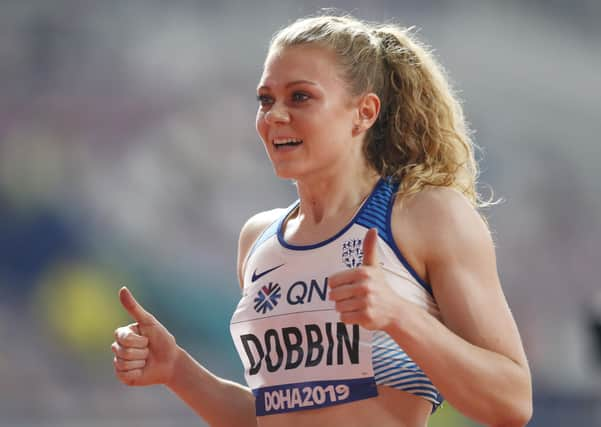

If you’d have told her that five years ago when she watched 200m sprinters at the Rio Games running more than a second quicker than her, Dobbin would have told you she didn’t have the talent or the confidence to reach such a level.
If you’d have told the 13-year-old who had an epileptic seizure in front of schoolfriends that she would rebound from that traumatic experience to be on the cusp of an Olympic vest, Dobbin would have gladly taken just being here and in control of her condition.
Advertisement
Hide AdAdvertisement
Hide AdAnd yet here she is, a top-two finish at the British Championships and Olympic trials away from sealing her place on the plane to Tokyo.
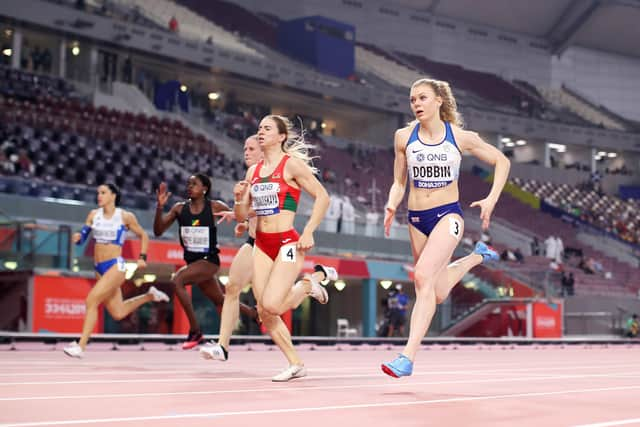

Hard work and resilience have got her to this place. That and the qualifying standard of 22.78 seconds.
Now she just needs to finish in the top two in a competitive field in Manchester to seal the deal.
“I can’t put it into words, it would literally be a dream come true,” says Dobbin, who has been captivated by running since the age of nine.
Advertisement
Hide AdAdvertisement
Hide Ad“I’ve wanted to go to the Olympics since watching Kelly Holmes winning double gold in Athens. Me and my Dad would go out for a run and I wanted to be Kelly Holmes. I may have chosen a different distance, but I can’t believe that this has happened to me.”
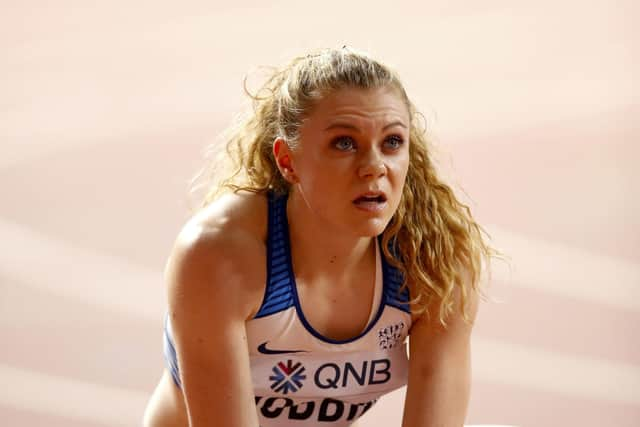

Holmes’s dominance of the middle distance events in Athens in 2004 prompted Dobbin to start as a cross-country runner in primary school.
It wasn’t until she was 12 when she joined Doncaster Athletics Club that the girl raised in Sprotbrough turned to sprinting.
“I did some testing to see what I was good at and they put me in the sprints group and that’s where I met my first coach John Blackshaw,” she says.
Advertisement
Hide AdAdvertisement
Hide Ad“It was a really good stepping stone for me, I really enjoyed my time there and some of the stuff I learned I still utilise to this day.”
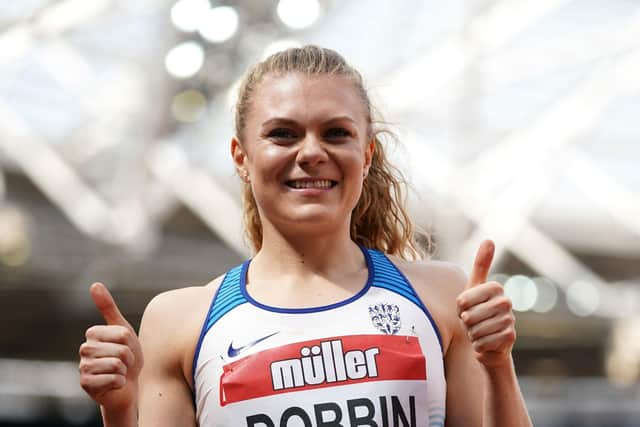

But it was while running was still a hobby that this promising schoolgirl suffered an epileptic seizure. It was a traumatic experience, one that put her athletics career back a few years, but one she feels is important to talk about now.
“I was 13 or 14 when I had my first seizure, it took the movement from left side of my body,” she remembers.
“I was put on medication to prevent seizures happening again, but it was quite hindering of my running, it made me really tired and as a result my training wasn’t going very well.
Advertisement
Hide AdAdvertisement
Hide Ad“When I came off my medication my performances got a lot better. People always ask ‘why did you come through so late’ and I always say ‘it was because I was on a lot of medication’.
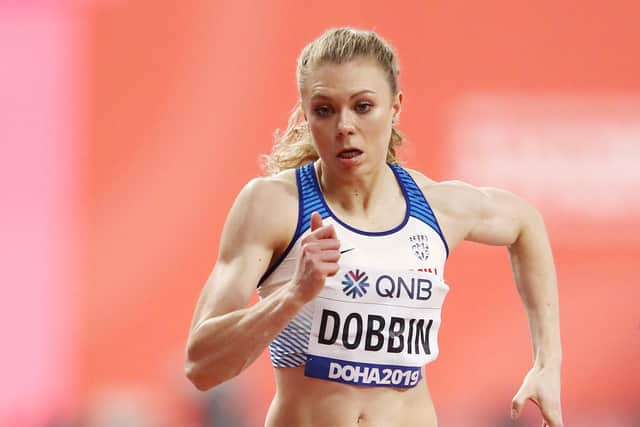

“Most sprinters are good when they’re 18, 19 and they build from there, whereas I didn’t come through until I was 22, 23, so have been playing catch up. That was because the medication was making me slower.”
Dobbin says she has not had a seizure for years, despite being medication-free, but it is always in the background.
“I’ll always have epilepsy and it’s always in the back of my mind that I could have a seizure, but my chances are lower because I’ve gone so long without having one,” she says.
Advertisement
Hide AdAdvertisement
Hide Ad“I still have to deal with the mental side of it like worrying about having a seizure. I do get quite a lot of flashbacks because it was at school in front of everyone when it happened and it was quite traumatic.
“I think about it a lot less now, but there was a period in my early 20s when I was thinking about it constantly and having a lot of flashbacks and worrying about having another one.
“Fortunately I’m in a lot better place now. I’m not saying I never think about it, but it’s a lot less than I used to.”
Epilepsy may have knocked her athletics career back a few years, but it was not the breaking of it. Once she came off the medication her progress was steady, if not so much spectacular.
Advertisement
Hide AdAdvertisement
Hide AdEven when she moved to Loughborough University at 18, studying was the primary goal, running was secondary.
“I never thought I was good enough at it to have a career out of it,” says Dobbin, who has been coached by Leon Baptiste for the last nine years.
Even when she graduated she did odd jobs. It took one race at a low key club event to change all that.
“It was in 2018 and I ran sub-23 seconds in the 200m for the first time and that day changed my life,” says Dobbin, who runs for Scotland, the country of her father’s birth.
Advertisement
Hide AdAdvertisement
Hide Ad“Sub-23 is seen as really moving, it earned me invites into the Diamond League, I was getting message from agents trying to get me a kit contract. That race just changed my life.
“It shocked me as well because I went so far under 23 seconds. I always thought if I did it it would be 22.99s. Because I went so low it made me realise I could actually do this.”
Dobbin earned a place on the Olympic funding programme that allowed her to go full-time.
Still, things did not go smoothly. She qualified for the world championships in Doha in 2019 and reached the semi-finals, but was hindered by niggling injury picked up in camp, that came on top of injuries that took away 15 weeks of training earlier in the year. Last year was equally frustrating. No races and no track time for training due to Covid.
Advertisement
Hide AdAdvertisement
Hide AdThrough it all she managed to reach the Olympic qualifying standard, a feat she repeated at the European Team Championships earlier this month.
“Deep down I wanted to get it again this year because it shows you’re in shape,” says Dobbin.
“Obviously now I still have to go and finish in the top two.”
Four women have the qualifying standard with the headline act Dina Asher-Smith understood to be focusing just on the 100m this weekend, with her selection for the 200m as good as guaranteed.
Advertisement
Hide AdAdvertisement
Hide AdSo the pressure is on Dobbin, which is exactly how she likes it.
“Luckily I do deal quite well with the pressure, I feel as though I perform better and execute a good race,” she continues.
“We’ve been working a lot on my left arm because it comes across my body quite a bit. Even Michael Johnson mentioned it when he was covering me at a race in Berlin. If he’s mentioned it, I’d better start working on it.”
She arrives in Manchester in as positive a place about herself and her health as she has ever been, ready to produce the performance of a lifetime.
Advertisement
Hide AdAdvertisement
Hide Ad“Because I came through so late I didn’t quite think I had the talent,” she says. “I know I’ve got a good work ethic, but I never thought this would happen to me. If I finish in the top two I think I’ll scream my head off.”
Comment Guidelines
National World encourages reader discussion on our stories. User feedback, insights and back-and-forth exchanges add a rich layer of context to reporting. Please review our Community Guidelines before commenting.